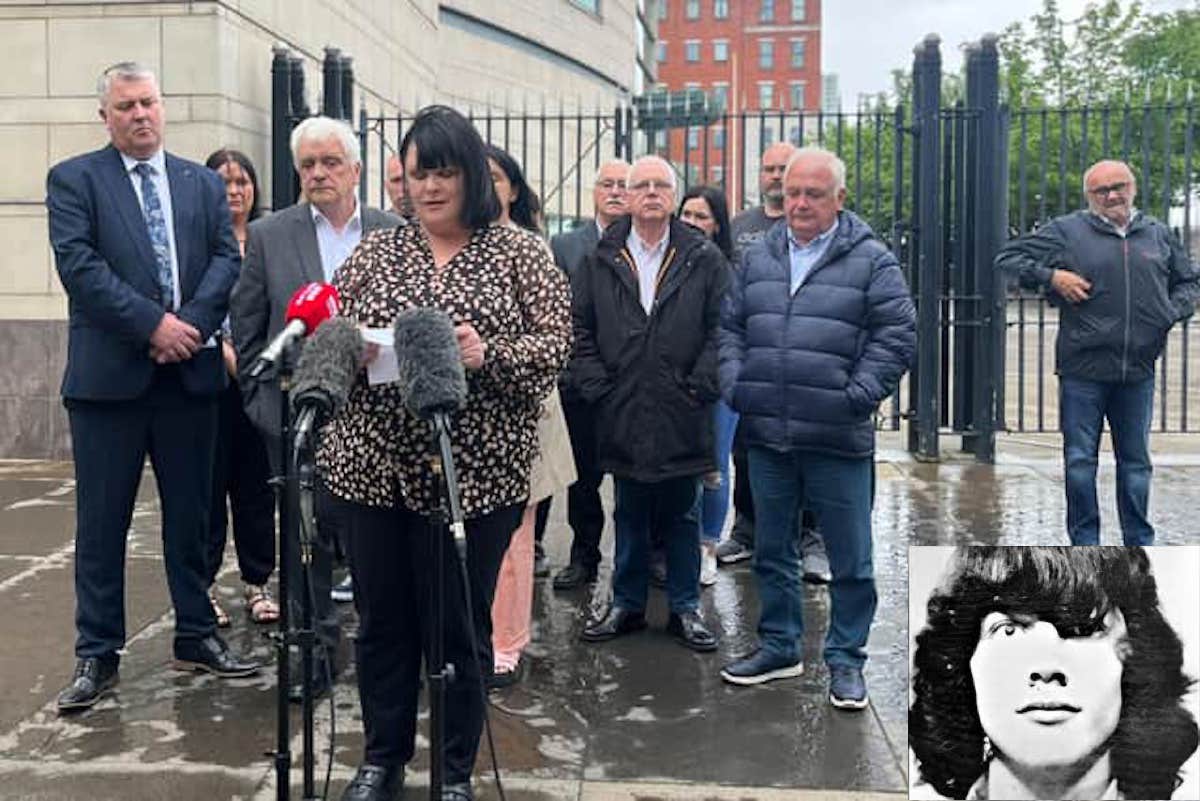
The family of a teenage boy killed by the British Army in 1975 has welcomed an inquest judgment that found he was entirely innocent when he was the victim of a cold-blooded military execution.
Leo Norney was 17 years old when he was shot dead by Lance Corporal John Ross MacKay.
Coroner Patrick McGurgan found it was likely that Mr. Norney’s killing was a “deliberate act” and that the other soldiers with Mr. MacKay gave false accounts to cover up what happened.
He found that the now deceased Corporal MacKay went out that night to “waste someone,” and Leo was the victim.
Following his death the British Army tried to claim that the teenager was one of two ‘gunmen’ who had opened fire on one of their patrols. Lies were later spread about the shooting and pressure put on the coroner’s office to say there was ‘gun residue’ on the teenager’s hands.
Following the shooting Leo’s body was taken to Springfield Road barracks, instead of the morgue, where the bones in his hands were shattered. The British Army searched his parents home five hours after the shooting but failed to tell them the teenager was dead.
Within days of the shooting Fr Denis Faul published a damning account of the incident with eye witnesses’ testimony which confirmed the teenager had been stopped and searched by the same British soldiers just minutes before he was shot, refuting claims he was armed.
While individual accountability is not now possible, the Coroner found that other members of the British Army patrol covered up MacKay’s murderous actions.
However, he found the evidence of ‘M2,’ one of the soldiers on the patrol and who told the inquest that MacKay wanted to kill someone that day, was credible, and he believed he was telling the truth.
In a scathing judgment, the Coroner said MacKay should never have been allowed back into the British Army after just completing a sentence for serious assault. He had been released from prison only two months before Leo Norney’s murder. The British Army then put MacKay in charge of a patrol when he was a clear danger to the public.
In a heartbreaking moment for his family, the Coroner pointed out that if MacKay had been thrown out of the British Army, Leo would still be alive.
Mr. Norney’s niece, Linda Norney, said that the British Army could have recanted but had maintained their lies about Leo for decades. She also stated her wish was that other families of victims of the conflict would be given justice.
“Leo was only a boy of 17. He had just got out of a taxi and was going to meet his girlfriend. Leo was not armed. He did not pose a threat to anyone. He was shot in cold blood, and his shooting is unjustified,” she said.
“However, the British Army did not just kill Leo. They also murdered his good name. Later that night, after the soldiers returned to their base, they concocted a false story which blackened Leo’s name for almost 50 years.
“They said that Leo was a gunman and that Leo had opened fire on them. Today, that narrative has been exposed for the deceit and lies that it is, and Leo’s good reputation has been restored.”
“It is sad that it was necessary for my family to have to pursue this for so long, but the British Army left our family with no alternative. Had they had the courage and moral decency to tell the truth in 1975, then this process would not have been necessary.
“Today my family fondly remembers Leo for what he was: an innocent, good-hearted, happy-go-lucky teenage boy.
“We also remember today Leo’s parents; his father Francis died prematurely aged 50 due to the heartbreak he suffered by Leo’s death, and his mother, Annie, who campaigned endlessly until her death to clear Leo’s name. Thank you.”
The Norney family lawyer, Fearghal Shiels of Madden & Finucane, said the ruling showed that the inquest system was working to expose wrongful state killings, despite efforts of the British government to stop it.
“This is another clear illustration that the inquest system continues to work for families seeking the truth as to how their loved ones died,” he said.
“It is an open and transparent process where documents are scrutinised and witnesses are publicly examined against all of the available independent and objective evidence.
“Today’s findings are not unique. It is the latest in a series of inquests in which unlawful state killings have been exposed and state cover-ups unraveled, and no one needs to look any further for the true reason why the British government is intent on pushing through legislation to end other similar inquests.”
Paul Butler of Relatives For Justice, who has supported the family for many years, added:
“This is a particularly damning set of findings about British Army brutality. The plain fact is that the authorities knew almost immediately what the true facts of the case were. Yet they, along with the other British soldiers on the ground, covered up the truth, which resulted in decades of hardship for the Norney family. The West Belfast community knew that Leo was not armed despite what British soldiers said. They knew that they were not there to protect civilians.
“And these findings are precisely why the British government is stopping inquests through its amnesty bill. Because inquests now have the ability to deliver the truth and establish culpability.”
![[Irish Republican News]](https://republican-news.org/graphics/title_gifs/rn.gif)
![[Irish Republican News]](https://republican-news.org/graphics/title_gifs/harp.gif)

